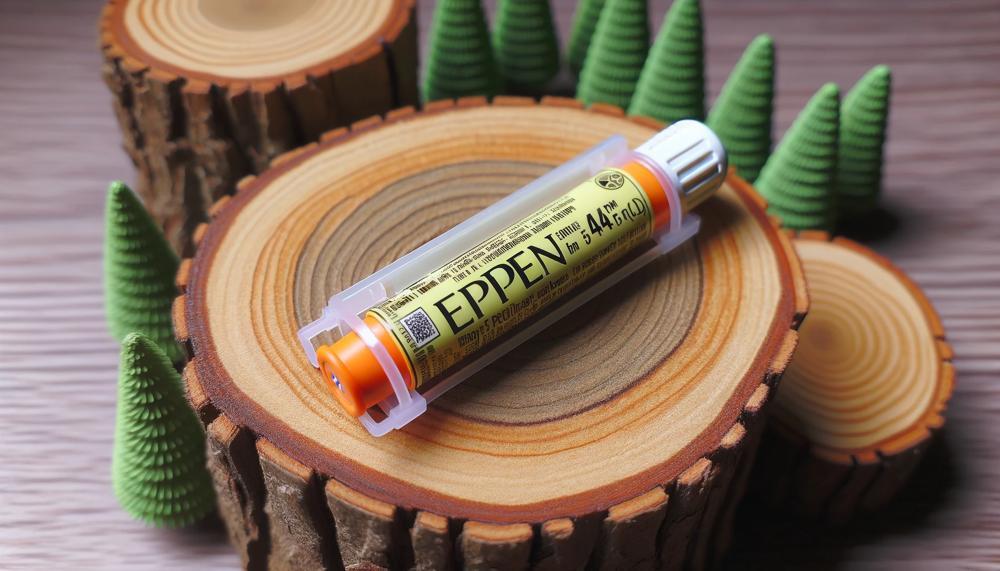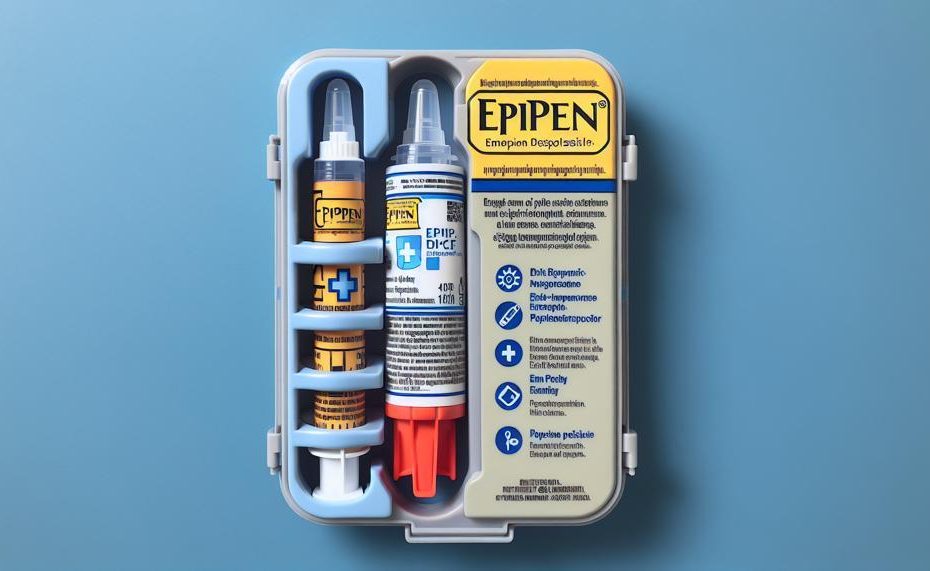Imagine this: you’re enjoying a beautiful day when suddenly, someone near you has a severe allergic reaction. In a panic, you scramble to find an epipen and administer life-saving medication. But what happens next? Do you know how to safely dispose of the used epipen?
Here are some ways to dispose of an EpiPen:
- Used EpiPens: Give the EpiPen to the healthcare professional you see after using it. You can also take it to the emergency department at your local hospital, where it can be safely thrown away.
- Expired EpiPens: Take expired EpiPens to a doctor’s office, hospital, or pharmacy for disposal. You can also take them to a local health department, police or fire department, trash and recycling facilities, or a permanent drug disposal box.
- Used adrenaline injectors: Always place used adrenaline injectors in a sharps container.
Throwing auto-injectors into your household trash could prick or injure people or pets in your home.
So, let’s dive in and learn how to properly dispose of an epipen – because saving lives doesn’t stop at administering medication. Let’s make sure we’re also taking care of our planet while keeping ourselves and others safe.
Contents
- 1 How To Dispose Of An Epipen?
- 2 Checking the Expiration Date: Why It Matters
- 3 Detaching the Needle: A Crucial Step in Safe Disposal
- 4 Guidelines from Local Recycling Centers for Medical Waste Disposal
- 5 Using Sharps Disposal Containers for Safe and Convenient Disposal
- 6 Mail-Back Programs: An Alternative Option for Proper Epipen Disposal
- 7 Consulting with Your Healthcare Provider for Specific Guidelines
- 8 Conclusion
How To Dispose Of An Epipen?
When it comes to disposing of an Epipen, it’s crucial to follow the instructions laid out by the U.S. Food and Drug Administration (FDA). This means taking out the needle from the device, putting it in a designated sharps container, and disposing of the container in accordance with local regulations.
Proper disposal of an Epipen is essential not only for the safety of others but also to prevent misuse or accidental exposure to its contents and minimize environmental damage.
As many people know, an Epipen is a life-saving device used to treat severe allergic reactions. But what happens when it’s no longer needed? Many people make the mistake of throwing it in the trash or flushing it down the toilet, not realizing the potential dangers it poses. The needle can easily puncture someone or expose them to harmful substances, while flushing it can contaminate our waterways and harm aquatic life.
So, how should you dispose of an Epipen? First, remove the needle by unscrewing it from the device. Place the needle in a sharps container, a specially designed container for sharp medical objects. Be sure to seal it tightly to prevent any leaks or spills. Then, dispose of the container according to your local regulations. Some areas allow for sharps containers to be thrown in the regular trash, while others require them to be taken to specific facilities for proper disposal.
Proper disposal of an Epipen not only protects those around you but also helps protect the environment.
Checking the Expiration Date: Why It Matters
At first glance, disposing of an EpiPen may seem like a simple task. However, checking its expiration date before doing so is crucial for several reasons.
First and foremost, EpiPens contain a life-saving medication called epinephrine. This medication can quickly reverse the symptoms of a severe allergic reaction. However, as time passes, the potency of the medication decreases, making it less effective in treating an allergic reaction. Therefore, it is essential to check the expiration date before disposing of an EpiPen to ensure that it is still safe and reliable for use in case of an emergency.
Moreover, using an expired EpiPen can be dangerous as it may not contain enough medication to stop a severe allergic reaction. This could lead to a potentially life-threatening situation, especially for individuals with severe allergies.
In addition to concerns for safety, expired EpiPens may also display visible signs of deterioration, such as discoloration or solid particles in the liquid. These are clear indications that the medication is no longer safe to use and should be disposed of properly.
To avoid any potential dangers, it is recommended to set a reminder on your electronic device to keep track of when your EpiPen will expire. This will allow you to replace your EpiPen before it expires and ensure that you always have a functional and effective one on hand in case of an emergency.
Furthermore, proper disposal of expired EpiPens is not just about personal safety but also environmental protection. Expired EpiPens should be disposed of in a sharps container to prevent harm to waste workers and reduce environmental contamination.
| CONCERN | REASONING | EXAMPLE |
| Ensures safety and effectiveness | Expired EpiPens may not contain enough medication to treat severe allergic reactions | If someone has an anaphylactic reaction and uses an expired EpiPen, it may not be effective in treating the symptoms and could result in a life-threatening situation |
| Avoids potential dangers | Expired EpiPens may have visible signs of deterioration, making them unsafe to use | Expired EpiPens may have discoloration or solid particles in the liquid, which are clear indications of deterioration and should not be used |
| Prompt replacement | Setting a reminder helps ensure that you always have a functional and effective EpiPen on hand | If you set a reminder, you can replace your EpiPen before it expires and avoid any potential risks of using an expired one |
Detaching the Needle: A Crucial Step in Safe Disposal
Detaching the needle from an epipen is an essential step in safely disposing of this life-saving device. This crucial step serves multiple purposes, including reducing the risk of accidental needle sticks and exposure to bloodborne pathogens, minimizing environmental contamination, and ensuring proper disposal methods are followed. By carefully removing the needle from the epipen after use, we can safeguard individuals and the environment while also adhering to regulations for disposing of medical waste.
Many people may not realize the potential danger of leaving a needle attached to an epipen after use. Accidental needle sticks can result in serious injury and exposure to bloodborne pathogens, such as HIV or hepatitis B. By detaching the needle before disposal, we significantly reduce the likelihood of these risks and protect ourselves and others.
Moreover, removing the needle from an epipen also helps to minimize environmental contamination. The plastic casing of an epipen is recyclable, but the needle inside is considered medical waste and cannot be recycled. By separating the two components, we can ensure proper disposal methods are followed, preventing unnecessary harm to our environment.
Guidelines from Local Recycling Centers for Medical Waste Disposal
- Ensure the epipen is fully utilized: It is vital to use the entire epipen before disposing of it. This not only guarantees that the device has been completely utilized, but also reduces the risk of unintended needle sticks during disposal.
- Retract the needle: After the epipen is empty, retracting the needle back into the barrel is crucial for safe disposal. This can be achieved by using a specialized tool or pressing down on a hard surface. By doing so, we can prevent injuries to waste management workers and minimize environmental contamination.
- Dispose of at designated drop-off locations: Many local pharmacies and hospitals have designated drop-off locations for used epipens. These facilities have specialized containers for proper disposal of medical waste. It is important to check with the specific recycling center beforehand and adhere to their guidelines for drop-off.
- Consider mail-back programs: Some recycling centers offer mail-back programs for disposing of epipens. This involves sending the used epipen back to the manufacturer or a designated facility for proper disposal. However, there may be a fee associated with this service.
- Recycle if possible: In some cases, epipens can be recycled by separating the plastic and metal components and recycling them separately. However, only certain types of epipens are recyclable, so it is best to check with the manufacturer or a local recycling center for more information.
- Never dispose of in regular household trash: It is crucial to never dispose of an epipen in regular household trash. This can lead to accidental needle sticks and harm to the environment. Always follow the guidelines set by local recycling centers for proper disposal.
By following these guidelines, we can ensure that epipens are disposed of safely and responsibly, protecting both our health and the environment.
Using Sharps Disposal Containers for Safe and Convenient Disposal
Sharps disposal containers are the most effective and responsible way to dispose of an epipen safely and conveniently. These specially designed containers offer a secure and practical solution for disposing of medical sharps, such as needles and lancets, without the risk of exposure to individuals or the environment.
By utilizing sharps disposal containers, individuals can easily dispose of their epipens immediately after use, without having to search for a suitable disposal location.
These containers also provide convenient options, like mail-back programs, that make it easier for individuals to properly dispose of their epipens. Not only does this ensure the safety of others, but it also helps protect sanitation workers from potential needle stick injuries.
It’s important to be responsible when disposing of medical sharps, such as epipens. These devices contain needles that can pose a serious health hazard if not disposed of properly.
Using sharps disposal containers eliminates this risk by providing a secure and convenient way to dispose of these items.
Mail-Back Programs: An Alternative Option for Proper Epipen Disposal
A novel and secure solution for disposing of expired or unused epipens is the mail-back program. This program entails sending the epipen to a designated facility for proper disposal, eliminating the risk of accidental exposure or use and protecting the environment from potential harm. Not only is this program convenient, but it also guarantees the safety of others by preventing the improper disposal of these life-saving devices.
Participating in mail-back programs can have positive impacts on the environment. Improperly disposed epipens can release harmful chemicals into the air and water, posing a threat to wildlife and ecosystems. By utilizing mail-back programs, individuals can ensure that these devices are disposed of properly, reducing their negative impact on the environment.
Moreover, mail-back programs offer a hassle-free alternative to traditional methods of epipen disposal. Many local pharmacies do not accept expired or unused epipens, leaving individuals with limited options for safe disposal.
With mail-back programs, individuals can simply package and ship their epipens to a designated facility without having to worry about finding a suitable disposal location.
Consulting with Your Healthcare Provider for Specific Guidelines
When it comes to getting rid of an EpiPen, there are some recommended guidelines you should follow. These include keeping it in its original protective case, not throwing it in the trash, and utilizing mail-back programs or designated drop-off locations for expired or unused EpiPens.
It’s crucial to consult with your healthcare provider for specific guidelines tailored to your location. They can also advise you on any local disposal options that may be available.
Moreover, your healthcare provider can educate you on the significance of proper disposal of medical waste and how it can affect not only your safety but also the well-being of others and the environment.
One important thing to keep in mind is that simply throwing away an EpiPen in the trash can have serious consequences. The chemicals inside the pen can leak out and cause harm to yourself, others, and the environment. That is why it is highly recommended to store the EpiPen in its original protective case. This ensures that the pen stays safe and secure until it is properly disposed of.
Consulting with your healthcare provider is also essential because they can provide you with specific guidelines based on your location. Different areas have different regulations when it comes to disposing of medical waste, so it’s crucial to follow the correct procedures.

Your healthcare provider can also inform you about any mail-back programs or designated drop-off locations for expired or unused EpiPens in your area.
Conclusion
In conclusion, the proper disposal of an epipen is imperative for both personal safety and environmental health. Unfortunately, many individuals are unaware of the correct way to dispose of their epipens, which can have harmful consequences for themselves and others. Simply tossing an epipen in the trash or flushing it down the toilet can lead to contamination of our surroundings.
To ensure safe and responsible disposal, it is crucial to follow the guidelines set by the U.S. Food and Drug Administration (FDA). This includes carefully removing the needle from the device, placing it in a designated sharps container, and disposing of it according to local regulations.
It is also essential to check the expiration date before getting rid of an epipen as expired ones may not contain enough medication to effectively treat severe allergic reactions.
Moreover, detaching the needle from an epipen is a crucial step in safe disposal as it reduces the risk of accidental needle sticks and minimizes environmental contamination. Local recycling centers offer helpful guidelines for properly disposing of medical waste, including epipens. Remember to never dispose of an epipen in regular household trash – instead, utilize designated drop-off locations or mail-back programs for safe disposal.
Another effective and convenient option for disposing of epipens is using sharps disposal containers. These containers not only protect individuals from potential harm but also safeguard sanitation workers from needle stick injuries.
Lastly, consulting with your healthcare provider for specific guidelines tailored to your location is highly recommended when getting rid of an epipen. They can provide valuable information on local regulations and educate you on how improper disposal can impact not only your safety but also that of others and the environment.





